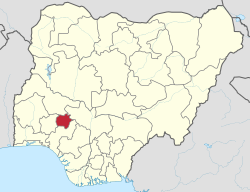Ekiti | |
|---|---|
| Nicknames: | |
 Location of Ekiti State in Nigeria | |
| Coordinates: 7°40′N 5°15′E / 7.667°N 5.250°E | |
| Country | |
| Date created | 1 October 1996 |
| Capital | Ado-Ekiti |
| Government | |
| • Body | Government of Ekiti State |
| • Governor | Biodun Oyebanji (APC) |
| • Deputy Governor | Monisade Afuye (APC) |
| • Legislature | Ekiti State House of Assembly |
| • Senators | C: Michael Opeyemi Bamidele (APC) N: Cyril Fasuyi (APC) S: Yemi Adaramodu (APC) |
| • Representatives | List |
| Area | |
• Total | 6,353 km2 (2,453 sq mi) |
| • Rank | 31st of 36 |
| Population (2006 Census) | |
• Total | 2,210,957 |
• Estimate (2022) | 3,592,200[1] |
| • Rank | 29th of 36 |
| • Density | 350/km2 (900/sq mi) |
| Demonym | Ekiti |
| GDP (PPP) | |
| • Year | 2021 |
| • Total | $15.20 billion[2] 23rd of 36 |
| • Per capita | $3,979[2] 18th of 36 |
| Time zone | UTC+01 (WAT) |
| Dialing Code | +234 |
| ISO 3166 code | NG-EK |
| HDI (2022) | 0.612[3] medium · 11th of 37 |
Ekiti (Yoruba: Ìpínlẹ̀ Èkìtì) is a state in southwestern Nigeria, bordered to the North by Kwara State for 61 km, to the Northeast by Kogi State for 92 km, to the South and Southeast by Ondo State, and to the West by Osun State for 84 km. Named for the Ekiti people—the Yoruba subgroup that makes up the majority of the state's population—Ekiti State was carved out from a part of Ondo State in 1996 and has its capital as the city of Ado-Ekiti.[4]
One of the smallest and most educated states with the highest number of professors in Nigeria, Ekiti is the 31st largest in the area and 30th most populous with an estimated population of nearly 3.5 million as of 2022.[5] Geographically, the state is divided between the Nigerian lowland forests in most of the state and the drier Guinean forest–savanna mosaic in the north. Among the state's nature are false acraeas, mona monkey, forest buffalo, and grey parrot populations along with one of the last remaining Nigeria-Cameroon chimpanzee populations with a troop of about 20 chimpanzees in the heavily threatened Ise Forest Reserve.[6][7] In March 2022, Ekiti State became the first state in Nigeria to adopt a state tree as one of its official symbols. On World Forest Day 2022, Governor Kayode Fayemi announced that Obeche (Triplochiton scleroxylon) had been chosen as State Tree owing to its local prominence and environmental, economic and cultural significance.[8]
Modern-day Ekiti State has been primarily inhabited for centuries by the Ekiti people, a Yoruba subgroup, with minorities of the Akoko Yoruba subgroup. Religiously, the majority of the state's population (~85%) are Christian with smaller Muslim and traditionalist minorities at about 10% and 5%, respectively.
In the pre-colonial period, the area that is now Ekiti State was at various points ruled by the Oyo Empire, Benin Empire, and finally, the Ekiti states which formed the Ekiti Confederacy in the latter half of the 1800s. From 1877 to 1893, the Confederacy fought the Kiriji War led by Fabunmi Okemesi alongside other Eastern Yoruba groups against the Ibadan Kingdom and other Western Yoruba groups; the war ended in a British-brokered stalemate before the area was colonized and incorporated into the British Southern Nigeria Protectorate which later merged into British Nigeria in 1914. After independence in 1960, the area of now-Ekiti was a part of the post-independence Western Region until 1967 when the region was split and the area became part of the Western State. In 1976, the Western State was split and the state's east became Ondo State. Twenty years later, Ondo State's northwest (then termed the Ekiti Zone) was broken off to form Ekiti State.[4]
Economically, Ekiti State is partially based on agriculture, mainly of yams, rice, cocoa, and cassava crops. Key minor industries are logging and tourism. Ekiti has the joint-thirteenth highest Human Development Index in the country and is considered the heart of the homeland of the Ekiti people.[9]
Educationally, Ekiti State has the highest number of professors in Nigeria.
- ^ "Ekiti State: Subdivision". www.citypopulation.de. Retrieved 7 February 2024.
- ^ a b Okeowo, Gabriel; Fatoba, Iyanuoluwa, eds. (13 October 2022). "State of States 2022 Edition" (PDF). Budgit.org. BudgIT. Retrieved 7 March 2023.
- ^ "Sub-national HDI - Area Database - Global Data Lab". hdi.globaldatalab.org. Retrieved 13 September 2018.
- ^ a b "This is how the 36 states were created". Pulse.ng. 24 October 2017. Retrieved 22 December 2021.
- ^ "Population 2006-2016". National Bureau of Statistics. Retrieved 21 December 2021.
- ^ Olaniyi, Oluwatobi; Adefurin, Olusola; Oluwaseun, Adegbola (June 2019). "Performance of Landsat 8 and Sentinel 2A in vegetation cover mapping of Ise Forest Reserve, Southwest Nigeria". Environtropica. 16.
- ^ Unah, Linus (3 April 2020). "Nigeria declares new conservation zone for most threatened chimpanzee". Mongabay. Retrieved 22 December 2021.
- ^ "Ekiti adopts 'Obeche' as state tree, plants 500,000". thehopenewspaper.com. 24 March 2022. Retrieved 30 June 2022.
- ^ "Human Development Indices". Global Data Lab. Retrieved 15 December 2021.


